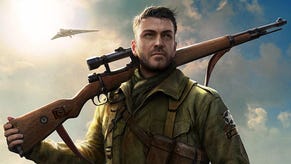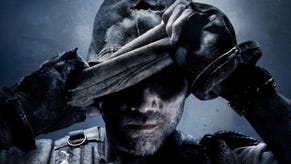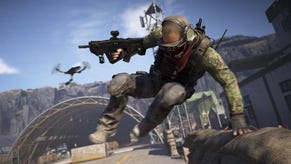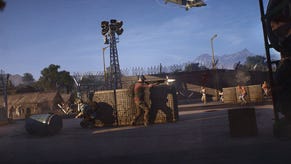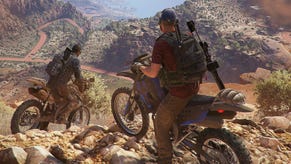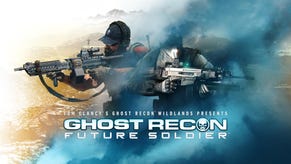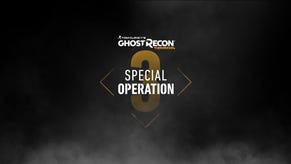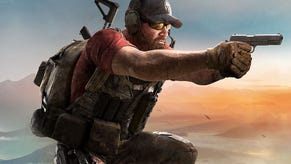Earth, Wind, and Gunfire: Exploring The Sounds of Ghost Recon: Wildlands
Ubisoft Paris shows off all the work that goes into one aspect of a game that players rarely notice: the sound.
This article first appeared on USgamer, a partner publication of VG247. Some content, such as this article, has been migrated to VG247 for posterity after USgamer's closure - but it has not been edited or further vetted by the VG247 team.
Not many people pay attention to the sound design and composition that goes into their favorite games. I know I don't. I barely pay attention to soundtracks outside of main themes and I rarely stop to appreciate the sounds of the digital worlds I'm inhabiting. Despite that, sound is important. It's necessary to create the verisimilitude of a game, to make it feel real and immerse the player in a world. Strip away the background chatter, ambient sound, and music of your favorite game and you'd be left with a drab, lifeless endeavor.
Sound is important, even if we don't always notice it.
The folks behind the sound in your favorite games know this. They understand that not all players will truly understand the hard work and craft that went into making sure that the "fwoosh" of a fireball is suitably powerful or ensuring that a music cue for an important moment fits just right. Many players only notice excellence or omission, something that Ghost Recon: Wildlands audio director Ghislain Soufflet explains to me during my visit to Ubisoft Paris.
"Sound is the element of the game that usually players really don't notice unless its very good or very bad," says Soufflet. "How do we use sound to make our open-world shine even more? How do we use sound to enhance the feeling of freedom that you get from warfighting and drug cartels in the Wildlands?"
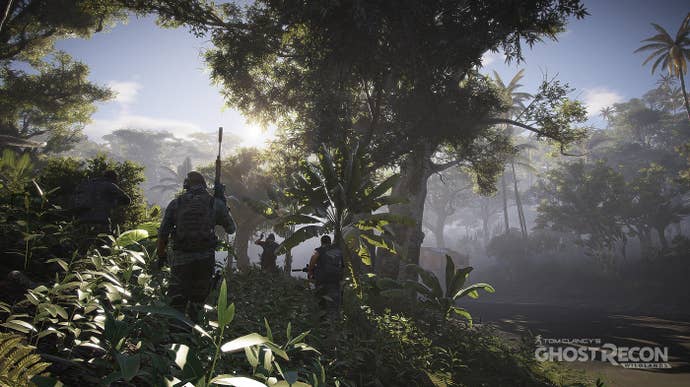
Finding The Heartbeat of Bolivia
Soufflet and the audio team at Ubisoft pride themselves on recreating this cocoon of sound that surrounds the player in Ghost Recon: Wildlands. Artists can spend years creating a fully-realized version of Bolivia, South America, but if it doesn't sound right, then all of that work is wasted. To ensure that digital Bolivia sounded like the real thing, Ubisoft had to travel there.
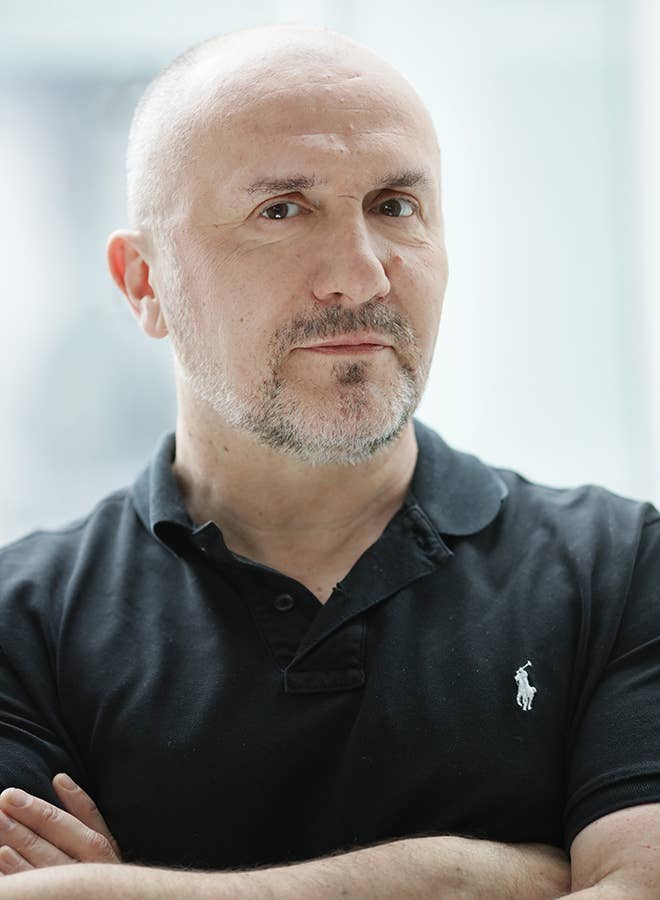
"It was clear from the start that one of the main characters of the game was the gigantic and beautiful open-world. So we start with the ambient sound. The sound of the game starts with the Wildlands, which is to say, the sound of Bolivia. In that regard, we wanted to give to the player a really authentic experience," explains Soufflet.
The core team traveled to Bolivia to capture the sounds of diverse life, from the living chatter of cities, to the harsh grating of mining work, to the quiet rustle of the wind whipping through canyons. Of the four-team research trip for Wildlands, Ubisoft had a dedicated, independent audio team, because they needed to be seperate from those photographing and visually recording the environment. The audio team needed to stay much longer in some places to truly capture a region's sound profile at all hours of the day. Ghost Recon: Wildlands has a full day/night cycle and Ubisoft wanted to retain the realistic beat of the world, whether a player was in town among the citizens of Bolivia at midday, or scanning the mountain peaks alone at night.
"A lot of the sounds that you hear were really recorded in Bolivia and they are used in the game as they were recorded," says Soufflet.
He plays a clip showing the one of the Ghosts simply standing in different areas of the game, to show off the sound profile of each region. I can hear the crunch of snow under foot and the winds whistling through the mountaintops. The soft swaying of the jungle and musical trills of the local fauna and reptile life. I make out the soft taps of the rain on the wide fronds in a swamp. (A different version of the clip is below.)
While the sounds are recorded, there's also a procedural nature to presenting them to the player. Take the wind for example, something that's rather important to accurately portraying Bolivia given its relative elevation and diverse biomes.
"One of the big conclusions of the trip to Bolivia is that it's a really, really windy country because of the height," Soufflet adds. "La Paz, the capital, is [one of] the world's highest big cities. It's up 3,600 meters high (11,913 feet above sea level to be exact). The wind is really strong and specific sounding. We had to create quite a complex wind system in order to recreate that in the game."
Ghost Recon: Wildlands' wind system takes into consideration all surrounding vegetation and objects, calculating how real wind would react to them. On top of that, it also takes into account the topography of the local terrain: height, exposure to the wind, and the type of terrain itself. If you were able to be in two locations at the same height with the same vegetation, the sound profile would still be different if one was on a mountain and the other was in a canyon.
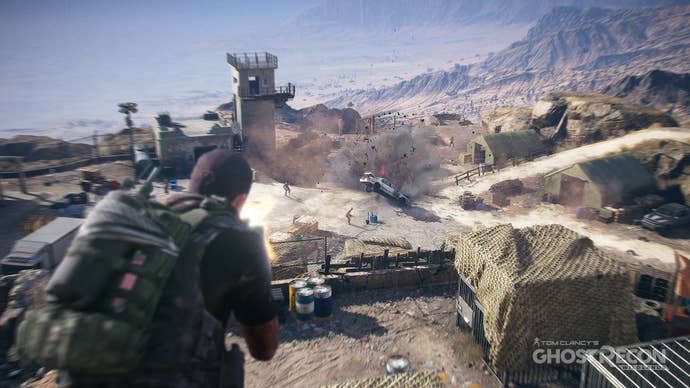
Boom Goes The Dynamite
Ghost Recon: Wildlands is a Tom Clancy game, meaning it's not just the ambient sounds of the world that need to be right. Weapons are the next layer in Ghost Recon's sound design; an M4A1 assault rifle doesn't sounds like a Beretta pistol or SPAS-12 shotgun. Ubisoft Paris drew on the expertise of the Red Storm Entertainment, Ubisoft's North Carolina-based development house that was founded by Tom Clancy himself. Red Storm tends to pitch in on Ubisoft's military-based titles, including The Division, Rainbow Six, and Ghost Recon games.
"As a Tom Clancy project, we want to be as realistic as possible," says Soufflet. "We have an authenticity manager [at Red Storm]. The authenticity manager works with the U.S. military and gun manufacturers and he knows how each model of gun is supposed to sound. It's our interpretation of a gun sound, but it goes through that authenticity phase."
"From the start, the really big question for us is, 'How does it sound when you shoot your gun in such a gigantic environment? How does it feel to fire your gun?' We wanted the the guns to be incorporated into the landscape, for the open-world to be a resonant chamber for our guns."
So Ubisoft developed a dynamic echo system for the weapon sounds, which was probably the coolest damn thing I saw on my visit, while also being the thing that I probably would've never noticed in-game. This is the kind of thing that's key to creating a game that feels real, but if you do you job right, the player will never notice the illusion.
Ghost Recon: Wildlands' dynamic echo system identifies all of the surfaces that can reflect the sound of a gun, whether it's a mountain, cliff, or huge rock. Then the system positions a reflector on the objects in your surrounding area. An echo is played at the position of each reflector. The echo length and delay time are calculated according to the distance between the gun and the reflector. This means that while the guns themselves sound very different, even the same gun sound has variety depending on where you shoot.
"It's an immersive and very powerful feeling when you shoot a gun in the wide open," says Soufflet.
Ghost Recon: Wildlands wants the whole world to react to your gunshot.
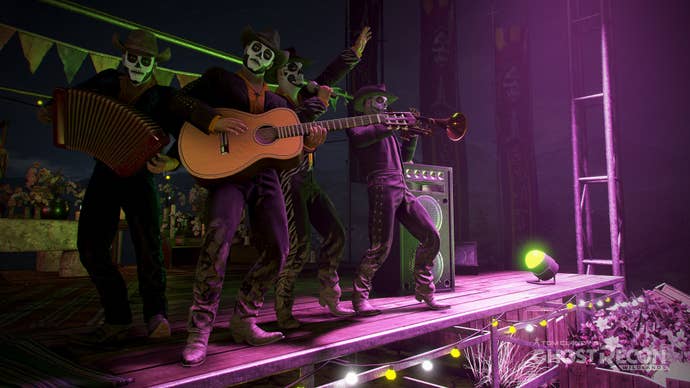
The Songs of the Cartels
The next level up is the background chatter of civilian life in Ghost Recon's Bolivia. For the audio team at Ubisoft Paris, the key here is radio. The radio is a important part of the game in the same way that it would anchor a sports title like Forza Horizon 3 or Burnout Paradise.
"Radio is really important," Soufflet explains. "Not everyone owns a TV set in Bolivia. Radio is as important in Bolivia now as it was in your society 50 years ago after the war. We figure that if a drug cartel was able to take over such a country, they would use the radio for propaganda. They mostly

You'll hear the radio in local shops and homes in a village. The people of digital Bolivia are living their lives in tandem with the sound of the radio, so it's all around you. Unless you're out in the middle of nowhere, you'll hear snippets of the radio playing in homes or gas stations. If you're driving your car and listening to a song or interview, you can exit your vehicle in a town and pick up the rest of that song or interview elsewhere.
In the fiction of Ghost Recon: Wildlands, the government of Bolivia has been taken over by the Santa Blanca cartel and co-opted into a narco state. Santa Blanca isn't an old school drug cartel spreading boring messages over the airwaves though. Instead, the cartel has bought and paid off a number of local celebrities. This includes the local DJs and several pop and folk music stars. Santa Blanca uses the radio to play up its image and create stories of its exploits.
DJ Perrico is the primary radio DJ in Ghost Recon Wildlands and Ubisoft has recorded a host of content for the fictional host, much like the aforementioned sports titles. Perrico has local talking segments, interviews, commercials, small jingles, and more, all focused on Santa Blanca. He'll interview cartel bosses and advertise local Santa Blanca bootcamps. The radio station also features lengthy songs Ubisoft created for the world of Ghost Recon: Wildlands: the narcocorrido.
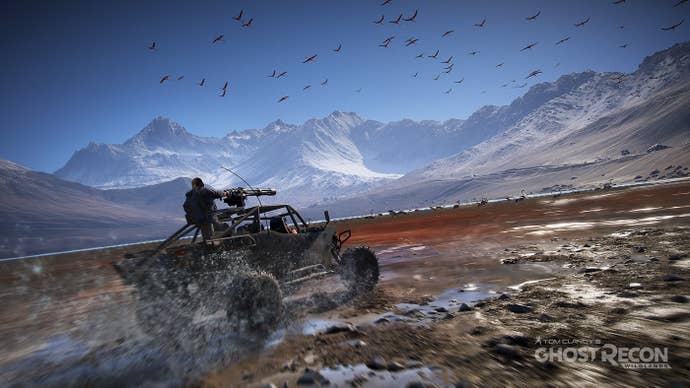
Ghost Recon: Wildlands music supervisor Manu Bachet has been in charge of the music for the series since Ghost Recon: Advanced Warfighter. For him and his team, the narcocorrido is a way to capture the flavor of the region, while also providing narrative information to the player.
"[Corridos] are narrative songs, very popular in Mexico," says Bachet. "There's a lot of accordion and trumpets. The rhythm most of the time is polka. There is a subgenre of corridos, named narcocorridos, which you can translate as 'drug ballad'. These are songs that tell the stories and achievements of famous smugglers."
For Ghost Recon: Wildlands, every boss has their own narcocorrido and the songs were all recorded with a real corrido band in Arizona. Together with the radio station, the corridos are intended to provide a strong South American flavor to the entire game.
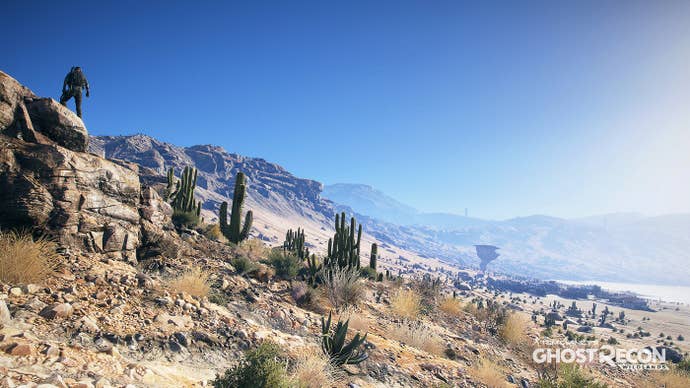
Jam Project
Radio is only part of the game's overall sound design though. The layers of Ghost Recon's audio continue to build, with ambient sounds, gunfire, and radio being joined by the game's actual soundtrack. Instead of simply composing and recording a soundtrack through, Ubisoft Paris decided to try something new.
"Most of the time, when the composer starts working on the game, there's not much of the game to see," says Bachet, outlining how game soundtracks are normally composed. "There's not much for him to compose to because the game is not there yet. It's concept art. So what we usually do is prepare some very detailed documents, describing everything, from the emotion, the feel, the mood, the BPM and scale we want to use. It's very heavy for the composer, with a lot of constraints."
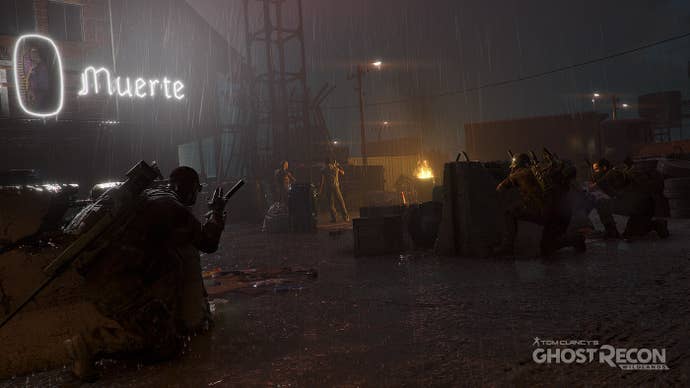
"When we started to work on designing the music, we thought it would not be the right way to go. One of the main elements of Ghost Recon: Wildlands is freedom. The freedom of the player to do whatever they want. We should give give the composer the same kind of feeling," he adds.
Thanks to Ghost Recon's extensive world engine work, by time the team started to compose the music, the game was looking good already. It was missing features and polish, but you could see digital Bolivia in front of you.
"So we were able to do something that has been done on movies a few times, like Miles Davis did on Elevator to the Gallows," Bachet says. "They improvised the music in front of the movies. No constraints except bringing emotion to the film. We thought this would be a good way to go."
So the team began looking for a composer that would be willing to improvise a score in front of a game. At the beginning of the Ghost Recon: Wildlands project Ubisoft had gathered a number of reference tracks for the overall South American sound. Within many of those reference tracks, the name "Alain Johannes" kept appearing.
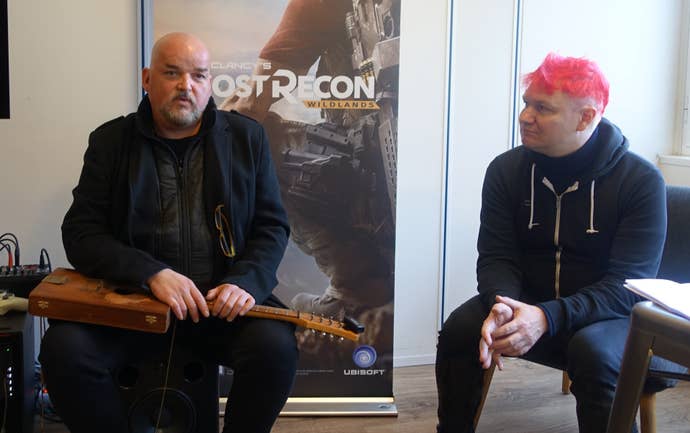
Alain Johannes is an instrumentalist, vocalist, and producer, best known as a member of Queens of the Stone Age or the producer for the Arctic Monkeys. Johannes is Chilean-American, born and raised in Santiago, Chile. So Ubisoft Paris' audio team contacted Johannes to see if he would be up for their experiment.
He said "yes".
"This is something that I've always dreamed about. I've always been engaged with the music aspect of a cinematic media and video games," Johannes tells me.
Ubisoft had already set up the tonal palette of Ghost Recon: Wildlands, with instruments like the charango, hand drums, shakers, and cigar-box guitar. Ubisoft traveled to Johannes' studio and spent nine days there composing the score for the game. There were screens in front of Johannes running the game and he would react the the environment onscreen.
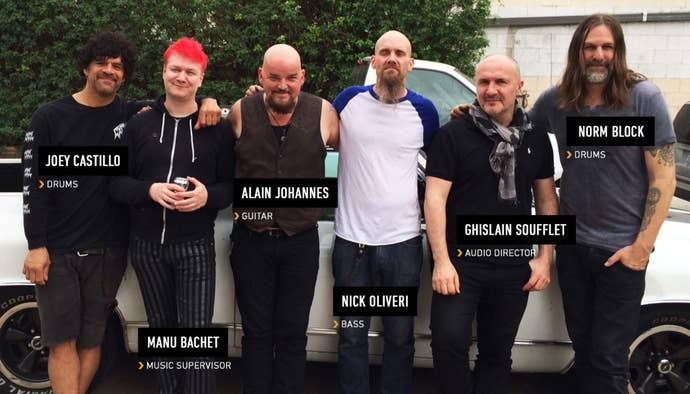
Once they had the basic structure, Johannes went to another larger studio and called on his friends and colleagues for help. These friends included producer Norm Block, singer Glenn Danzig, and Queens of the Stone Age members like bass guitarist Nick Oliveri and drummer Joey Castillo.
"I've known these guys for a long time and I knew that they would be very open to the idea of improvising. I trust them with their musicality," says Johannes. "We would go in with two drum sets - which is kind of hard to pull off - and watch gameplay. Then [Manu Bachet] would kind of guide us through and we'd start jiving on it. Within ten or fifteen minutes were were already in the zone."
They ended up recording ten hours of music in total, with three hours ending up in the game itself.
"For me it was so great to be able to do it like that," Johannes admits. "It brought out a feeling of spontaneity. This was a badass team and we had such a great time. I love improvising. I think you reach higher heights by taking a chance and jumping off the cliff. All the music that I love has improvised elements in it. An additional component that feels fresh and a little bit dangerous. You feel that."
The score for Ghost Recon: Wildlands is peppered with a throwback to the series' history. The theme for Ghost Recon: Advanced Warfighter, composed by Tom Salta, reappears here and there in Wildlands, remixed within the South American sound Johannes and the audio team came up for the game.
Improvise The Music, Improvise the Playback
Of course, Ghost Recon: Wildlands isn't a film or linear experience. It's an open-world title, where the player can tackle obstacles in any order they choose or simply decide to wander the countryside. The music composed by Johannes and Bachet doesn't simply play all the time in game, it's sampled dynamically depending on what's happening.
"It's not like in a movie. You don't know what the player is going to do at any point. In a movie, you know when a guy is going to come out of the door. In the game, we need to adapt," explained Bachet. "Most of the time, you have exploration music going on and then you get attacked and the music switches."
"We wanted to avoid having music all the time in the game. We wanted to avoid the wallpaper effect," he adds.
Bachet tells me that the idea behind Ghost Recon: Wildlands' soundtrack is to have less music than previous Ghost Recons, because the game is not scripted. There's more music in Wildlands than previous titles, but you'll hear less music overall because of the size of the game and the trend away from always having the background music playing.
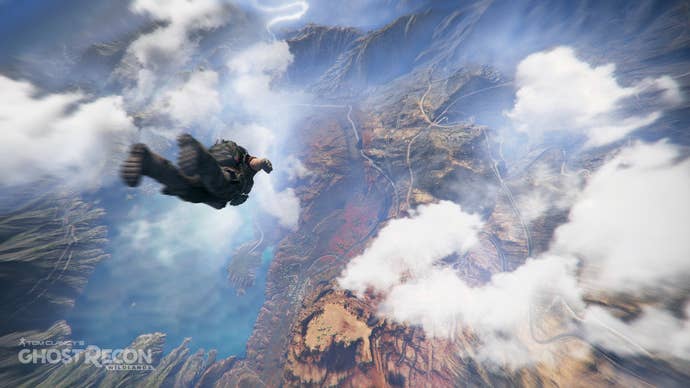
"When you're exploring, you can reach the top of a mountain and then you're going to hear a musical phrase for 30 or 40 seconds and then it's going to vanish in the wind," says Bachet. "Just a reminder that music is there. When you get closer to a camp or start to do stuff, the music will follow the action. We want the player to listen to the fantastic ambience that we have in the game."
Within all these layers, Ghost Recon: Wildlands' sound also has to take into account what's most important during each moment. There's no need to work on the ambient sound, radio, and soundtrack if it's all presented in the game as a dense cacophony.
"We want to offer enough room for everybody in the mix," says Soufflet. "When you shoot a gun, it creates what we call a gun bubble. The gun bubble dims all the ambient sounds and the world becomes calmer, quieter so that the guns and the music can take their place and mix nicely."
This means that Ghost Recon: Wildlands can go from the player listening to the wind in the trees, to hearing the familiar nacrocorridos playing in a nearby delivery truck, before ending on the boom of a grenade launcher over the improvised soundtrack. And if the team at Ubisoft Paris did their job, you won't even notice the work that went into all that, because you'll be so immersed in the world they've helped create.





